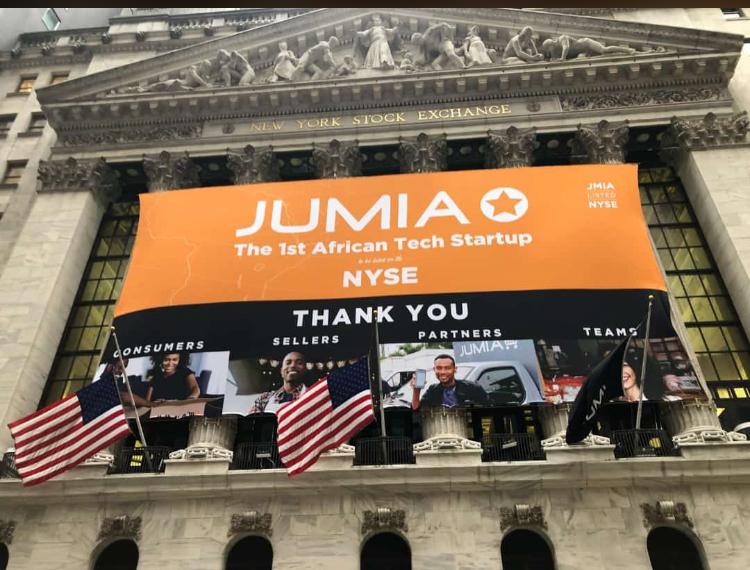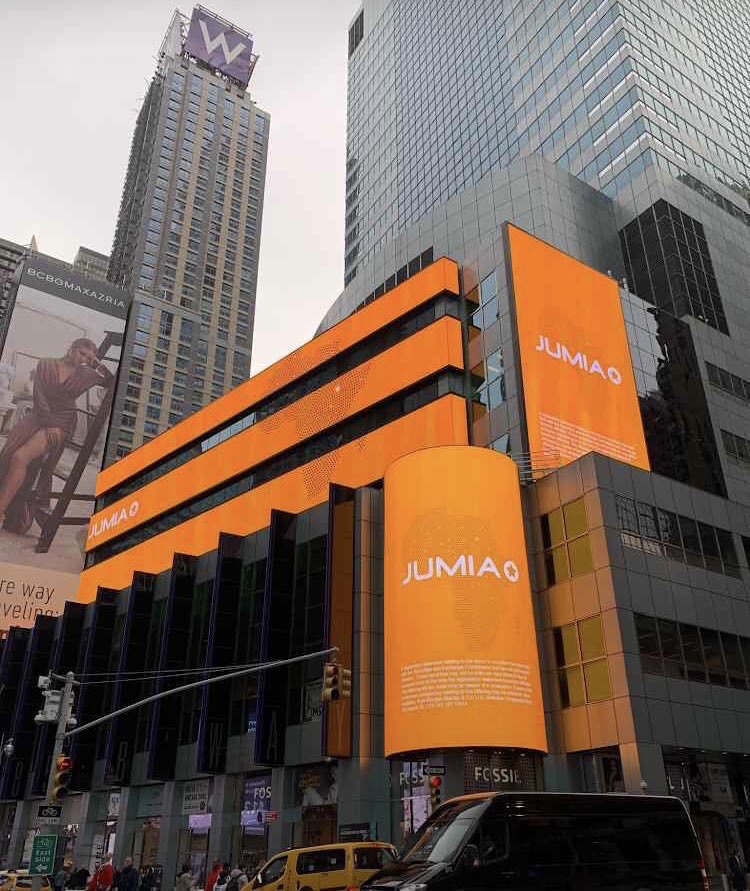Q: Why did Jumia decide to list on the New York Stock Exchange (NYSE)?
A: This is the largest stock exchange in the world; many technology companies are listed on the NYSE (Alibaba, Twitter, Snap). By joining the NYSE and by being the first African technology company to do so, we want to show the digital innovation happening in Africa and the opportunities from Africa in terms of tech and e-commerce. We contemplated several venues, ultimately, we met a lot of investors and New York seemed the more natural place given the number of investors familiar with the business model. There are more investors with marketplace and Tech focus in New York than in London. We made a logical choice.
Q: Why is Jumia doing an IPO?
A: We have been private for 7 years, we see a lot of upside to being public. For us, this is really about creating more trust and raising the public profile to help the business:
- Raising the public profile is going to help us bring more sellers to Jumia. Many sellers or partners are yet to know about us, and once they do, we hope they will be keen to work with us.
- We also hope this will help us build even more trust with consumers, in particular those who are still not comfortable with e-commerce may now see us as an established company and, we hope this will help our growth and consumer adoption.
- We also hope that this will help us with talent recruitment and retention, as we aim to attract more attention from top talents.
Q: What is the size of the IPO? What is the valuation of Jumia?
A: Please refer to the registration statement on EDGAR here (www.sec.gov).
Q: Is Jumia an African company?
A: Scope: YES. Jumia only operates in Africa (14 countries) and will never go anywhere else. Jumia has invested heavily in tackling major infrastructure challenges including investing in logistics and delivery. It has also developed a proprietary online payments technology.
It’s also worth noting that though our 2 CEOs are French, like many companies where CEOs/Founders are of a different nationality, and a small team of key account managers in Dubai (to oversee partner brands whose HQ are in Dubai) Jumia’s management and staff in most countries are largely local, including country heads.
Jumia has international shareholders, like many other companies and we are bringing investors to the African tech scene and building the economy and talent there. We directly employ more than 5,000 people in Africa and believe that our business has a significant indirect impact on job creation across the continent.
Investors: Though initially funded by German investors in 2012, we got one of our main shareholders (and still do to date) MTN in SA. It is amazing that international investors are bringing positive news to the whole tech scene in Africa and for many more startup companies after us. Now that we are public, any African investor is welcome to invest in Jumia. Nigeria is our HQ in Africa, and our incorporation in Germany, is a way to get foreign investors excited to send funds to Africa to boost our operations.
Mission: Our mission remains to help make our consumers’ everyday lives better and save time and money. We are also helping our sellers grow their businesses through our platform; as evidenced by the fact that we have fostered economic growth for 80k sellers on the continent.
Q: Why is Jumia’s financial holding in Berlin?
A:Most international investors have challenges when they try to push money to Sub Saharan African countries as investment. So they’re more comfortable with investing in companies incorporated in the US or markets they’re more familiar with.
Q: What is the plan to become profitable and satisfy investors?
A: Jumia is growing rapidly. Please understand that we are not able to comment on the specific projections. You can see in the registration statement that in 2018, Jumia delivered GMV growth of 63.3%. Revenue from third party sales grew by 121.5%; for the last two years, Jumia has also delivered positive platform contribution at group level, and for the biggest market, Nigeria, positive contribution after all fulfillment expenses during the second half of 2018. We are working on the long term, we have invested heavily in infrastructure (warehouse, logistics), marketing and management. Among our existing shareholders are investors who are operating in Africa.
Q: What’s the competition like in Africa?
A:
- No other pan African player
- No local competition in most of our markets except South Africa and Egypt
- In South Africa, there is Takealot, who belongs to Naspers. We are focused on the fashion vertical in this market
- In Egypt, there is Souq, which is Amazon. Amazon bought Souq in 2017, Souq is a Middle East player with presence in Egypt. We’ve been growing very well since then, we’re doing very well in Egypt, because we are very agile, very local. We feel very good about our position in this market.
Q: What are the intentions of Jumia shareholders? Do they all want to sell, and will your share price not suffer some setback as a result?
A: This IPO is all primary, and is about providing resources to the company and not shareholders selling shares.
Q: Why do you have your development center in Portugal?
A: People in Africa are super talented & entrepreneurial; there are GREAT developers in Africa; what has historically lacked is infrastructure. We made the decision in 2012 to host our development team in Portugal because it made sense to do so due to technical reasons. It was the best option for us due to the internet connection, Data Center, Cloud, etc.
Q: Do you have any developers working in Africa?
A: We do, though in limited numbers in Nigeria, Morocco and Egypt. We are focused on providing skills training and development to our local teams across the African countries we operate in, to enhance local talent and support. We continue to watch the exciting evolution of development of talent closely. Outside of this, we are committed to localising talent & building skill sets, which is what we have done in the last 2 yrs in Paid marketing, CRM, Shop, HCP, etc. No one else on this continent is developing people with pure eCommerce skills as much as we are – Commercial, content development, last mile logistics, Operations, Customer Service etc
Q: When do you think you will have all your developers in Africa?
A: Andela is the living proof of this and there are many many other initiatives everywhere. Yet, there is a huge need for developers across all economic sectors and it’s hard for companies to find enough developers. This is true in Africa, and all the world also, which is why a lot of companies have multiple tech centers and not only one. We already have developers in several countries of Africa and are super committed to recruiting and training even more! Everything should be in Africa!!
Q: What are you doing to help local startup ecosystem?
A: Jumia also acts as an incubator, where a lot of talent passes through and is developed, as we continue to reinforce the value of learning and growth. As a result, dozens of startups across Africa have been built by Jumia ex-employees and are doing very well. Our aim, as we grow, is to also empower those who encounter Jumia in all levels. Click here to see what the first 50 employees of Jumia have been up to since they left the company.

P.S: If you have any urgent question that is not yet covered, kindly email [email protected], and your questions will be addressed.
